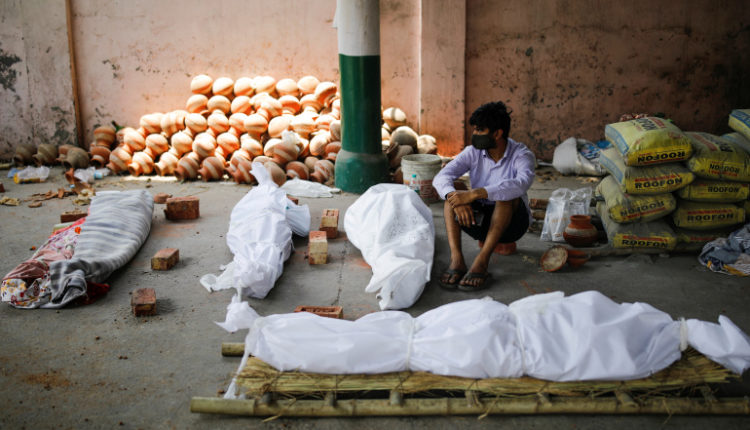India’s coronavirus death toll is nearing the bleak milestone of 200,000 with another 2,771 fatalities reported while its armed forces have pledged urgent medical aid to help battle the staggering spike in infections.
Over the past 24 hours, India recorded 323,144 new cases on Tuesday, slightly below a worldwide peak of 352,991 reached on Monday, with overrun hospitals turning away patients due to a shortage of beds and oxygen supplies.
India, home to approximately 1.3 billion people, has so far reported 17.64 million COVID-19 infections and 197,894 deaths but experts believe the tally runs significantly higher.
“Please note that a huge fall in daily cases … is largely due to a heavy fall in testing,” Rijo M John, a professor and health economist at the Indian Institute of Management in the southern state of Kerala, said on Twitter.
“This should not be taken as an indication of falling cases, rather a matter of missing out on too many positive cases!”
The Indian government has called on its armed forces to help tackle the devastating crisis.
Chief of Defence Staff General Bipin Rawat said late on Monday that oxygen would be released from armed forces reserves and retired medical personnel would join health facilities that are struggling under the sheer number of cases.
Briefing Prime Minister Narendra Modi about the army’s preparations to deal with the crisis, Rawat said any oxygen cylinders the military had would be diverted to hospitals in need of the life-saving gas.
Other retired medical officers have been urged to provide consultations through emergency helplines, according to a government statement.
Nursing staff and medical officers on staff appointments at military headquarters will be deployed to support overburdened health workers.
Nationwide shortage of oxygen
The first “Oxygen Express” train for Delhi carrying around 70 tonnes of the life-saving gas also reached the national capital early on Tuesday.
But the crisis in the metropolis of 20 million people continues unabated.
Dr K Preetham, the chief of medical administration at the city’s Indian Spinal Injuries Centre which is treating dozens of COVID-19 patients, said the scarcity of oxygen was such the hospital was splitting oxygen cylinders between patients.
“For seven days, most of us haven’t slept. Because of the scarcity, we are forced to put two patients on one cylinder and this is a time-consuming process because we don’t have long tubes,” he said.
People wearing protective face masks wait to receive COVID-19 vaccine at a vaccination.
The World Health Organization said it was working to deliver 4,000 oxygen concentrators to India, where a “perfect storm” of mass gatherings, more contagious variants and low vaccination rates have sparked the outbreak.
“Many people rush to the hospital, even though home-based care monitoring…can be managed very safely,” its spokesman, Tarik Jasarevic, told Reuters news agency in an email.
Hospitals, patients and their families and friends in other main cities have also issued desperate appeals for medical oxygen, hospital beds and medicines.
Many patients have been forced to turn to the black market where the prices of life-saving medicines and oxygen cylinders have skyrocketed.
In some of India’s worst-hit cities, bodies were being cremated in makeshift facilities in parks and parking lots, while television channels showed images of bodies crammed into an ambulance in the western city of Beed as transport ran short.
At the Sarai Kale Khan cremation site in Delhi, for instance, about 60-70 bodies are being handled every day, beyond its usual capacity of 22.
Now, at least 100 new platforms for funeral pyres were being raised in an area nearby, in anticipation of rising death rates, media reports said.
Other cities and administrative bodies are also running out of land for burials and cremations, due to the huge numbers of virus-related deaths.
R Ashoka, a minister in the southern state of Karnataka, told India’s NDTV network the regional government is identifying land for temporary crematoriums on the outskirts of state capital Bengaluru.
Source: BBC


Comments are closed.